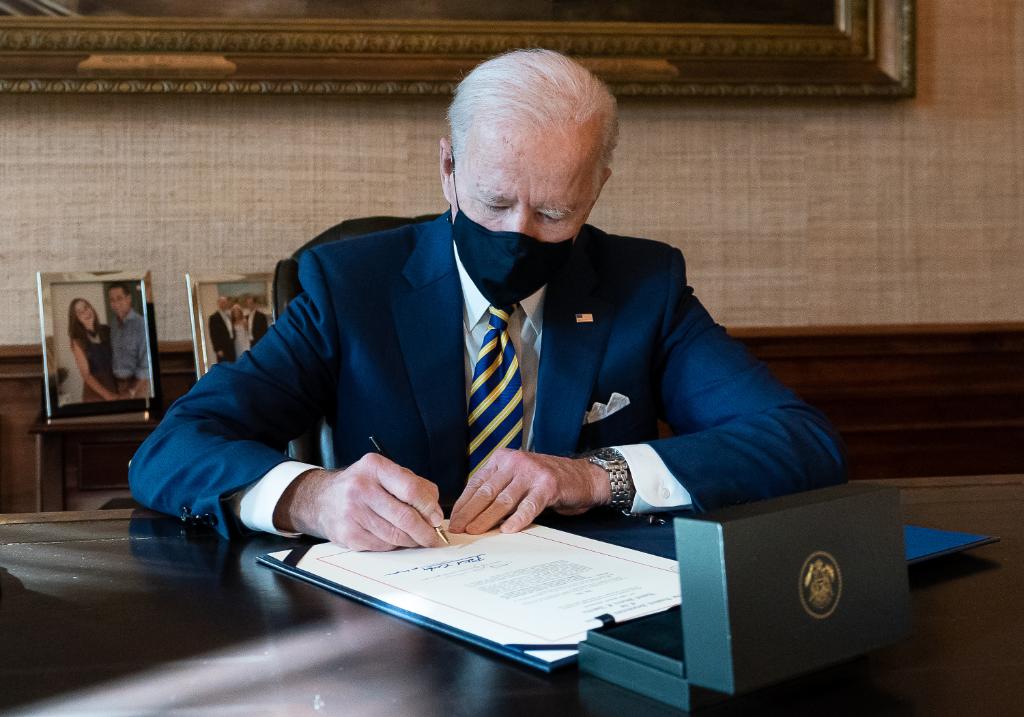
Ignored No Longer: Biden Makes Climate Change a National Security Priority
Inauguration Day was two weeks ago, and President Biden has wasted no time acting on his campaign promises to tackle the climate crisis, including making climate change a national security priority.
Rejoining the Paris Agreement
On day one, as promised, President Biden signed an Executive Order (EO) recommitting the US to the Paris Agreement, and the US will rejoin the Paris Agreement on February 19. President Biden’s action to rejoin the Paris Agreement is a crucial first step in rebuilding international credibility on climate change, which has national security implications.
The US withdrawal from the Paris Agreement was illustrative of the US’ broader retreat from climate leadership, which left a vacuum China has attempted to fill. Over the last four years, China has sought to expand its influence through climate diplomacy in regions of strategic importance to the US, such as the Indo-Pacific. Rejoining the Paris Agreement is a critical first-step in restoring US credibility and regaining some of the influence it lost.
Building on the President’s action to rejoin the Paris Agreement, Special Presidential Envoy for Climate Secretary Kerry addressed a group of world leaders on day two. During his remarks, Secretary Kerry emphasized “humility and ambition.” Humility is important because “we know that the federal government of the United States, until yesterday, walked away from the table for four wasted years when we could’ve been helping to meet the challenge.” Given the US’ absence over the last four years, we must elevate our ambition and tap into our ingenuity and creativity: “Trying to combat climate change without innovation would be expensive, complicated, and unpopular. The good news is, we don’t have to face that choice. We can solve this challenge as we have so many others – together, through innovation.”
Elevating Climate Change as a National Security Priority
During the campaign, President Biden committed to elevating climate change as a national security priority. On just his seventh day in office, President Biden signed an EO to begin the process of making good on that commitment.
The EO states, “It is the policy of my Administration that climate considerations shall be an essential element of United States foreign policy and national security.” The EO continues by reaffirming the President’s appointment of former Secretary of State and ASP board member, John Kerry, to be his Special Presidential Envoy for Climate, which will have a seat on the National Security Council, and it creates a Senior Director for Climate and Energy on the National Security Council. These actions demonstrate the President’s intent to incorporate climate change into all national security considerations.
The President’s EO doesn’t stop there. It includes other important climate security actions, including:
- Requesting a National Intelligence Estimate (NIE) on the national and economic security impacts of climate change; (a major intelligence action requiring the approval of the heads of all 18 intelligence agencies);
- Directing the Secretary of Defense and Chairman of the Joint Chiefs of Staff to consider the security implications of climate change in the “National Defense Strategy, Defense Planning Guidance, Chairman’s Risk Assessment, and other relevant strategies, planning, and programming documents and processes” along with an annual update on the progress made;
- Directing the Secretary of Defense, in coordination with a number of other agencies across government, to develop an analysis of the security implications of climate change, “Climate Risk Analysis,” that can be incorporated into modeling, simulation, wargaming, and other analyses; and
- Directing the Secretary of Homeland Security to consider the implications of climate change in the Arctic and along our Nation’s borders.
ASP has called for elevating climate change as a national security issue since its founding in 2006. ASP has written about the need to better understand the national security implications of climate change and including climate in intelligence assessments. Members of ASP’s Consensus for America have traveled across the country to talk to citizens about the climate threats to military bases and infrastructure, readiness and operations, and global stability. We have written about the role climate change is playing in the strategic rivalry between great powers in the Arctic and elsewhere.
Ensuring Climate Leadership at Home
It is crucial US policymakers expand the way they think about national security to include the risks associated with climate change; that change starts with leadership. During Inauguration Week, the Senate held hearings on key national security and cabinet nominees, and each one referenced climate change.
Director of National Intelligence (DNI) Avril Haines called climate change a “critical transnational threat.” She also noted that while China is adversarial in some areas, climate change is one area of potential cooperation.
Secretary of Defense Lloyd Austin promised to appoint a person on his staff to help him “focus on the issue” of climate change. He also noted, “Climate change is drastically altering the natural environment of the Arctic–and the strategic balance.”
Homeland Security Secretary-Designate Alejandro Mayorkas noted the department’s role in combatting threats like climate change and that being “prepared for and resilient to natural disasters” requires work with state, local, tribal and territorial governments.
Secretary of State Antony Blinken and Secretary of the Treasury Janet Yellen both termed the threat “existential.” Secretary Blinken also suggested working together more closely with India on mitigating climate change, and Secretary Yellen said she would “look to appoint someone at a very senior level to lead our efforts” on climate change.
Conclusion
The executive actions the Biden administration has taken are crucial first steps in the right direction. Now comes the hard part: developing a deliberate and systematic interagency process to incorporate climate-induced threats into strategic assessments. ASP will continue to provide analysis on the myriad of climate threats, policy recommendations for mitigating and adapting to climate threats, and the climate security work the Biden administration is doing.






